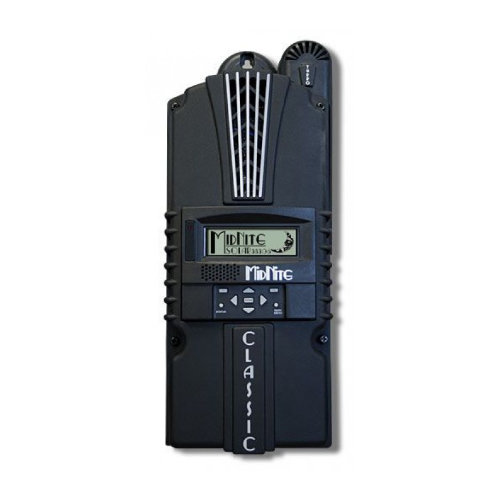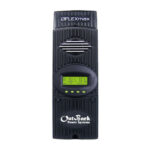Solar Charge Controllers
What is a Solar Charge Controller?
A charge controller is needed in virtually all renewable energy power systems that utilize batteries. Charge controllers regulate the power coming from your solar panels, wind turbine or other source to your batteries to prevent overcharging. Overcharging batteries will at the very least significantly reduce battery life and at worst damage the batteries to the point that they are unusable, so it is important to control battery charging to protect battery life.
Types of Solar Charge Controllers
 The most basic charge controller simply monitors battery voltage and opens the circuit, stopping the charging when the battery voltage rises to a certain level. More advanced charge controllers, Pulse Width Modulation or PWM, slowly lower the amount of power applied to the batteries as the batteries approach a full charge. This type of controller allows the batteries to be more fully charged with less stress on the battery, extending battery life. It can also keep batteries in a fully charged state (called “float”) indefinitely. The newest and best charge controller technology is called maximum power point tracking or MPPT. MPPT solar controllers convert excess voltage into amperage, increasing the amount of power you can get from your renewable energy system.
The most basic charge controller simply monitors battery voltage and opens the circuit, stopping the charging when the battery voltage rises to a certain level. More advanced charge controllers, Pulse Width Modulation or PWM, slowly lower the amount of power applied to the batteries as the batteries approach a full charge. This type of controller allows the batteries to be more fully charged with less stress on the battery, extending battery life. It can also keep batteries in a fully charged state (called “float”) indefinitely. The newest and best charge controller technology is called maximum power point tracking or MPPT. MPPT solar controllers convert excess voltage into amperage, increasing the amount of power you can get from your renewable energy system.
PWM or MPPT Charge Controller – Which one is right for me?
PWM Solar Charge Controllers
PWM charge controllers reduce the voltage from your solar or wind system to that of your battery bank, resulting in a decrease in efficiency. The efficiency loss depends on the size of the voltage mismatch between your system input and batteries. PWM charge controllers are less expensive than MPPT solar charge controllers but are best only for smaller systems or where the additional power provided by an MPPT charge controller is not really needed.
MPPT Solar Charge Controllers
MPPT solar charge controllers are the most efficient type on the market; they are also the most expensive. They allow your solar panels (or wind turbine) to operate at their optimum voltage levels in varying conditions; summer, winter, morning, noon, cloudy, etc., by taking the voltage output of your system and comparing it to the battery voltage. It then calculates the best voltage to get maximum AMPS into the battery. Remember it’s the AMPS that matter. Put another way, the MPPT charger controller tracks the best voltage level and then converts it to the voltage of your system (12, 24, 48VDC). This “tracking” of the optimal power point improves performance by as much as 30%.
Another benefit of MPPT charge controllers solar is that many can accept high input voltages (up to 120+V DC) and efficiently convert the DC voltage to that of your system so that you aren’t losing any generated power and you are able to use what you generate more efficiently. Additionally, using a higher DC voltage on the input side allows you to use thinner wire, decreasing your wire cost and making installation easier.
MPPT and PWM technologies are not mutually exclusive; you do not have to choose between one or the other. Several charge controllers use both technologies, but adding MPPT charge controllers circuitry increases the cost of a charge controller. When selecting the right charge controller to be sure to consider how many panels you are using, what your battery bank power storage capacity will be and how much load your power system will create. You should also consider how long you will need to run the system (years). The annual power gains from an MPPT charge controller solar can offset the cost savings of a controller only using PWM in many situations, and thus make it worth the extra cost.
Best MPPT Solar Charge Controller
There are probably a hundred or more solar charge controller brands, so how do you know which product will have the features and reliability that your battery-based solar system needs? We can help.
For an off grid cabin or a grid hybrid house, the industry leaders are OutBack Power and MidNite Solar.
OutBack Power Charge Controllers
OutBack Power was founded around 2002 by three engineers who left one of the original manufacturers of battery-based solar equipment, Trace Engineering. Since it’s founding, OutBack has grown into the worldwide leader of integration hardware and power conversion electronics for solar, wind and hydro systems.
Ask anyone who knows anything about battery-based solar, and they will attest to the advanced features, reliability and dependability of the OutBack FM80, FM60 and FM100 charge controllers.
OutBack charge controllers are our preferred product for our full service and DIY solar customers, because they work seamlessly with OutBack inverters – the OutBack Radian and OutBack FXR inverters, the best grid hybrid and off grid inverters made. OutBack charge controllers can be used with power inverters made by other manufacturers, but perform optimally when paired with an OutBack power inverter. Browse OutBack Solar Charge Controllers.
MidNite Solar Charge Controllers
Another spinoff of Trace Engineering, MidNite Solar, manufactures pre-wired inverter systems, combiner boxes, charge controllers, pre-wired renewable energy systems, surge protection devices and other high quality power system components. And in 2021 they introduced their first inverters, the MidNite Solar DIY series.
MidNite Solar charge controllers are an excellent choice for many battery-based power systems, and integrate well with inverters from Magnum, Schneider Electric, SMA and Samlex. The MidNite Solar Classic charge controller offers advanced features and they are extremely reliable. Browse MidNite Solar Charge Controllers.
Believe it or not, there are two other Trace Engineering spinoffs with strong reputations in the solar industry who also make MPPT charge controllers.
Magnum Energy Charge Controllers
Now a member of Sensata Technologies, Magnum Energy makes inverters and charge controllers for solar, marine and mobile applications. Magnum makes only one MPPT charge controller, their 100 amp PT-100.
Xantrex MPPT Charge Controller
In 2008, Multinational company Schneider Electric purchased Xantrex Technology, a Trace Engineering spinoff known throughout the solar industry since the early days for their solar inverters and charge controllers. Today, the Xantrex C 35, C40 and C60 charge controllers continue to be an industry standard for small battery based renewable energy systems.
Schneider Electric Solar Charge Controllers
Though not a direct spinoff of Trace, Schneider Electric (who now owns the Xantrex brand), manufactures their own line of battery-based inverters and charge controllers for the renewable energy market.
Other Reputable Solar Charge Controller Brands
As we said, there are a lot of solar charge controller manufacturers, too many for us to detail or be experts on. If none of the manufacturers we’ve mentioned above have what you need, below is a list of a few more brands that have a good reputation. Click on the links to learn more about their products:
Blue Sky Solar Charge Controller (Sunforge)
Morningstar Solar Charge Controllers
Renogy Rover Solar Charge Controller
Victron Energy Solar Charge Controllers

